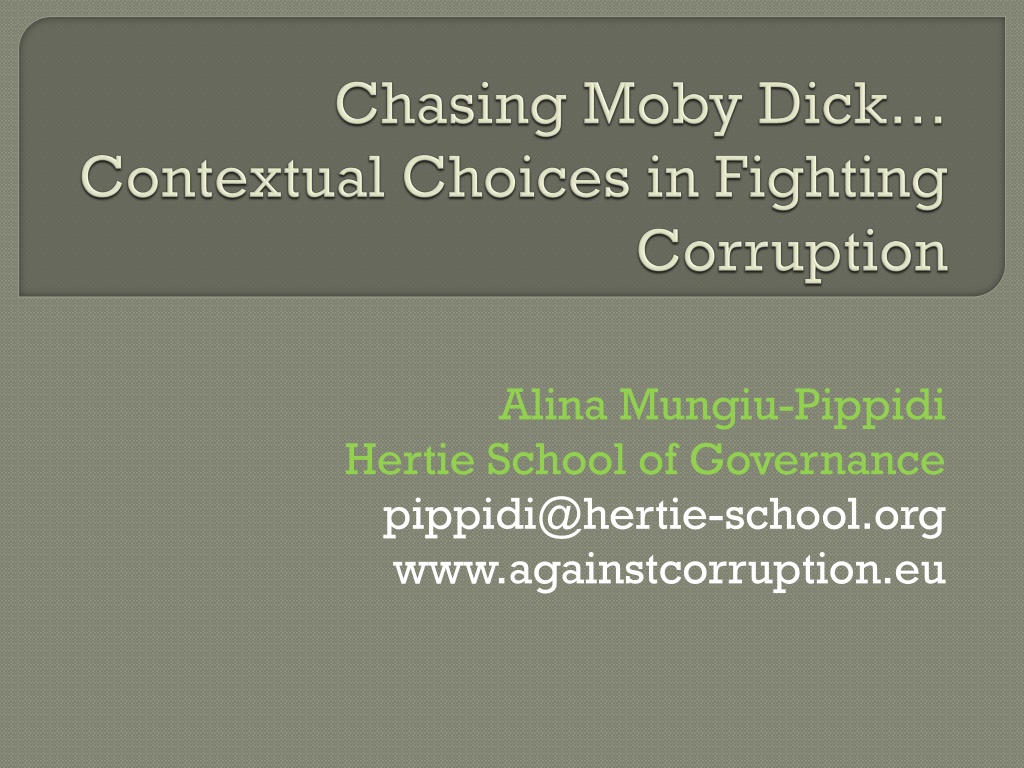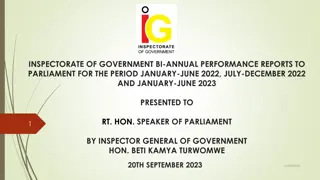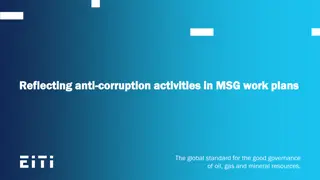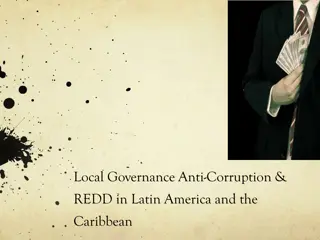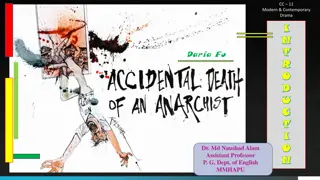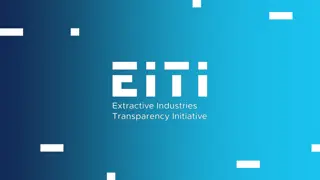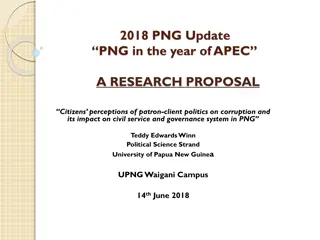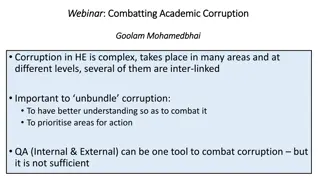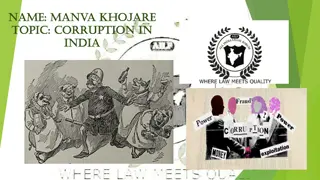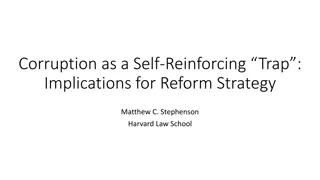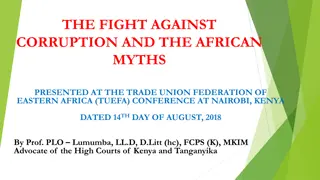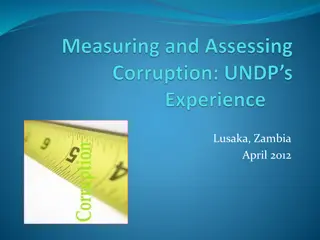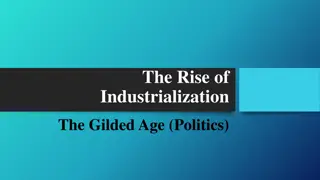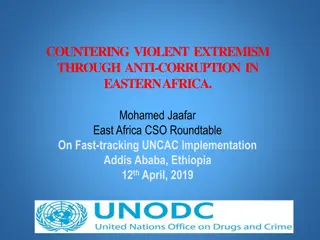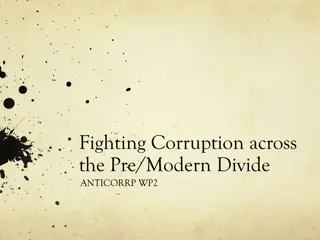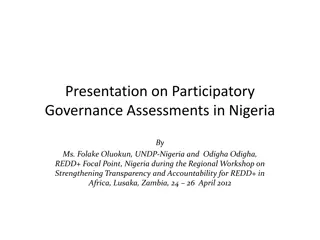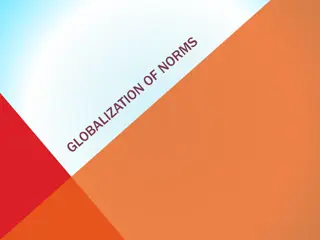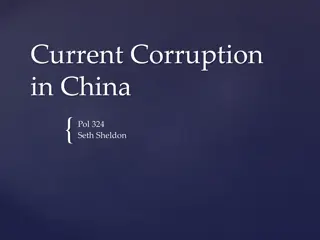Understanding Corruption, Governance, and Societal Norms
Alina Mungiu-Pippidi delves into the complexities of corruption, governance regimes, and societal norms, emphasizing the need to transform governance systems rather than just combat illegal corruption. She explores the concepts of corruption at the individual and societal levels, governance regimes, particularism versus universalism, and different orders of power distribution. The discussion highlights the challenges in addressing corruption effectively and the importance of norm-building instruments in promoting ethical universalism.
Download Presentation

Please find below an Image/Link to download the presentation.
The content on the website is provided AS IS for your information and personal use only. It may not be sold, licensed, or shared on other websites without obtaining consent from the author. Download presentation by click this link. If you encounter any issues during the download, it is possible that the publisher has removed the file from their server.
E N D
Presentation Transcript
Alina Mungiu-Pippidi Hertie School of Governance pippidi@hertie-school.org www.againstcorruption.eu
Borderline Historical achievers Early achievers Contemporary achievers Partly free or not free achievers United Arab Emirates Hong Kong Ghana Belgium Austria Australia Canada Estonia Spain Georgia San Salvador France New Zealand Slovenia Singapore Czech Republic .etc Cape Verde Mauritius Denmark Finland Luxemburg Ireland Japan Iceland Portugal St Kitts and Nevis Uruguay Bhutan Liechtenstein Netherlands St Lucia Barbados Antigua and Barbuda Bahamas Chile St Vincent and the Grenadines Botswana Taiwan S. Korea Malta West Germany Poland Norway Sweden Switzerland UK USA Andorra Bavaria Prussia
1. Confusion about objectives: we try to change whole governance regimes, not just fight illegal corruption 2. Indicators insensitive to change and 3. Instruments are therefore not quite up to the task
Corruption always defined at the individual level, as deviation from norm of integrity/universalism, with societal context marginalized Governance= formal and informal institutions determining who gets what in a polity Governance regime = salient and stable rule of the game Norm-infringing instruments versus norm building
Particularism - a social mode of organization in collectivistic societies, where standards for the way a person is treated (including by the state, but not only) depend of the group the person belongs to; includes vertical favoritism (patronages, clientelism), horizontal (networks), kinship and ethnic based favoritism, bribe Universalism - the practice of individualistic societies, in which persons are treated similarly regardless the group they belong to Which one is the rule of the game (majority of transactions carried in this particular way?)
Limited access order Open access order (Neo) Competitive particularism Borderline Patrimonialism Hierarchical with monopoly of central power Stratified with power disputed competitively Power distribution Competitive with less stratification Citizenship. Equality State autonomous from private interest (legal lobby , etc) Ethical universalism State captured in turn by winners of elections Archipelago of autonomy and captured islands State captured by ruler State autonomy Public allocation (services, goods) Particular and predicable Particular but unpredictable Particular and universal Separation private-public No No Poor Sharp
The duty officer on the Titanic noticed the upper tip. But it was the iceberg s part under the water which hit and sunk the ship.
Very few instruments allow discerning the 2 key policy features we need for policy design: 1. 1. What is the exception and what the norm in a particular category of transactions? 2. 2. Is this changing? All aggregate and subjective indicators fail to do this
Policy indicators 1: measuring favoritism in allocation of public funds ROMANIA S NATIURAL EMERGENCIES FUND ALLOCATION Share of funds for main govt party % 2004 2008 2010 (Democrat Liberals) 62 (SDP) (Liberals) 49 45 Share of vote in local elections of govt party % 36 16 29
Policy indicators 1: measuring favoritism in allocation of public jobs Evolution of Confidence and Gratification Positions in the Brazilian Executive Federal Government, December 2010
Governance regimes= equilibria Klitgaard 1978 Corruption = Monopoly + Discretion Accountability Mungiu-Pippidi 2010 Corruption/control of corruption = Resources (Power + Material resources) Constraints (Legal + Normative))
Understanding governance regimes Resources > Constraints = Particularism/Neo-P Constraints>Resources= Universalism/Good governance/control of corruption Good question: How can we change from particularism to universalism? How far can we manipulate resources or constraints by policy, as external agents?
Evolution in time for corruption and democracy
MODE;L EXPLAINING CONTROL OF CORRUPTION MATERIAL RESOURCES Informal Economy (% of GDP) Ease of Doing Business (1-183; 1 is best environment) Fuel Exports (% of merchandise exports) POWER RESOURCES Number of Years Ranked 'Free' (0-38; 38 is most Free years) NORMATIVE CONSTRAINTS Internet Users (per 100 inhabitants) Protestant Religion (% of population in 1980) Civil Society Organizations (per 100.000 inhabitants) Personal Autonomy and Ind. Rights (0-16; 16 is most autonomy) LEGAL CONSTRAINTS Independent Judiciary (0-2; 2 is most independent) CONTROL HDI (0-1; 1 is most developed) Constant Also tested, insignificant -0.017*** (-0.004) -0.004** (-0.001) 0.001 (-0.002) - UNCAC --ACA --Ombudsman --Presidentialism -Unicamerailism -Electoral system----- Constitutional Courts -0.006 (-0.006) 0.013*** (-0.003) 0.004 (-0.002) 0.007* (-0.003) 0.073** (-0.027) -Tested, sign in diff versions: 0.188* (-0.077) - FOIA - Media freedom --Ethnicity - Mineral resources -0.39 (-0.568) -0.091 (-0.397) 114 0.839 N R2
The impact of FOIAs 6 ICRG Control of Corruption Score 5 4 3 2 -10 0 10 20 0 = year of FOIA introduction ICRG Control of Corruption Score lb/ub
The impact of UNCAC 3 ICRG Control of Corruption Score 2.5 2 1.5 -5 0 5 0 = year of UNCAC ratification ICRG Control of Corruption Score lb/ub
The impact of ACAs 3.5 ICRG Control of Corruption Score 3 2.5 2 1.5 -5 0 5 0 = year ACA came into power ICRG Control of Corruption Score lb/ub
5 4 3 2 1 1983 1988 1993 1998 2003 2008 Year Albania Estonia Romania Bulgaria Hungary Slovenia
10 5 0 -5 -10 1985 1990 1995 2000 2005 2010 Year ICRG Control of Corruption (from 1 to 6) Polity Score (from -10 to 10)
Not one single institution explains achievers cases, which present great variation across the group None evolved on behalf of legal constraints alone; reducing resources and increasing normative constraints was the main element (except Botswana) Emulation worked better than conditionality
Two European paths: - less complex and numerous communities reached good governance already in medieval times on the basis of community participation good designs - complex larger European countries evolved thru enlightened monarchies which developed bureaucracies against challengers and reached GG prior to introduction of universal franchise; independence of judiciary was last. Models hard to reproduce, as democracy and modernization multiply resources of corruption
Neo- patrimonialism Support for groups challenging power monopoly, civil society Competitive particularism Cash on delivery for adoption of FOIA and second generation FOIA legislation, domestic conflict of interest laws, red tape cuts Borderline Requirements as to govt participation Minimal; requires just adoption, not implementation; maximal in NeoP Power resources cash for delivery against privatization of natural resources, budget transparency cash for delivery against privatization of natural resources, budget transparency Formalization programs when income > 3000 cash for delivery against privatization of natural resources, budget transparency Medium; requires implementation in good will Material resources Internet infrastructure support community level Media and civil society watchdogs support Internet infrastructure support community level Media watchdogs support Internet infrastructure support community level Media and civil society watchdogs support None Normative constraints Political pressure for judicial independence Cash on delivery/cash for delivery against judiciary political and material autonomy; support for legal education Technical support for judiciary Large Legal constraints
1. Diagnose and find indicators allowing measuring rules of game in time 2. Lay the grounds waiting for windows of opportunity 3. Search for losers and help them build drivers of change coalitions 4. Cash on delivery for adoption of institutional weapons in a functional state; drying resources 5. Internet and support for watchdog media 6. UNCAC national review boards inclusive of significant NGOs, media
